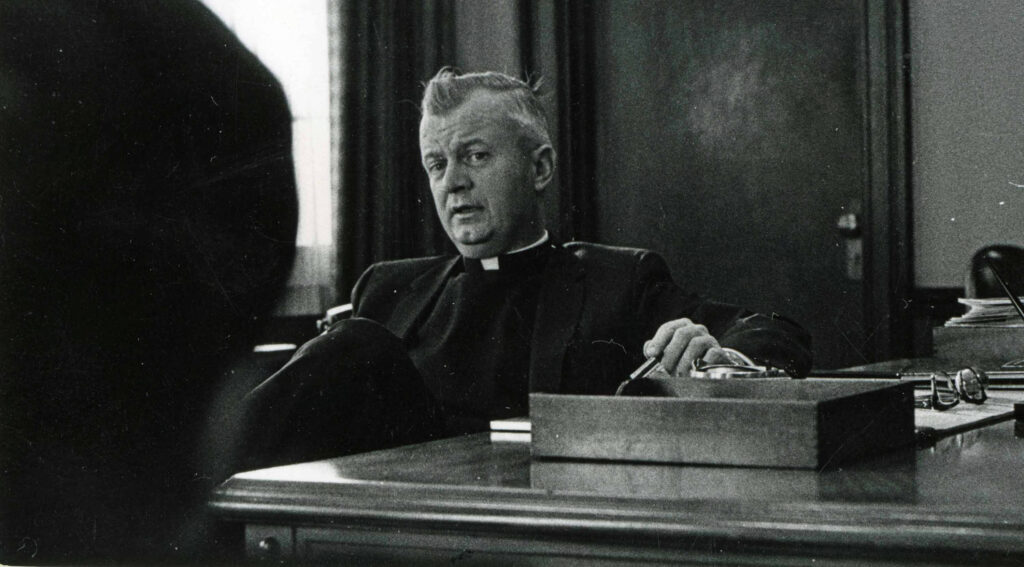BY CONSIDERING THE GREATER CONTEXT OF WRITER ANDRE DUBUS’S CATHOLIC IMAGINATION, LOGOS AUTHOR NATHAN KILPATRICK INTRODUCES AN ELEMENT OF DUBUS’S WORK IN LOGOS 25:2, SPRING 2022, NOT PREVIOUSLY DESCRIBED BY SCHOLARS, NAMELY ITS PENITENTIAL DIMENSION.
Andre Dubus’s character Joe Ritchie in the novella “Adultery” returns to the sacrament of penance with an awareness of his sins, but Joe returns to seek an external authority that pulls him out of his moral morass and offers community that prepares him for his death. First published in 1974 in The Sewanee Review, “Adultery” is one of three novellas that make up a trilogy detailing the complications of the open marriages of Edith and Hank Allison and Jack and Terry Linhart. Joe Ritchie, Edith’s co-adulterer and a former priest, is ultimately a minor character in the larger trilogy and within the novella “Adultery” itself, though no less significant for his minor status. As Edith thinks through what demands her broken marriage can make of her, it is her relationship with Joe that allows the reader to understand the ways in which sin isolates a person and penance reconciles him to the communities that will sustain him.
The isolation caused by sin becomes apparent early in the story, when Joe thinks through his relationship with Edith. Despite having been a priest, he tries to justify their adultery by insisting on the lack of nuance confessors might have for their situation:
It was not that he believed he was sinning with her; it was that he didn’t know. And if indeed he were living in sin it was too complex for him to enter a confessional and simply murmur the word adultery; too complex for him to burden just any priest with, in any confessional. He recognized this as pride: the sinner assuming the anonymous confessor would be unable to understand and unwilling to grapple with the extent and perhaps even the exonerating circumstances of the sin, but would instead have to retreat and cling to the word adultery and the divine law forbidding it.
Within this description, Joe admits a lack of clarity concerning what he is doing with Edith. Neither denying nor confirming that their relationship is sinful, Joe attempts to understand the complicated mix of felt emotion and commitments to which both he and Edith are obligated. Importantly, Joe recognizes that refusing confession is a kind of pride, for he assumes that his understanding of the “exonerating circumstances” is superior to the priest who might hear his confession. More significant, however, is Joe’s isolation. Though he remains in relationship with Edith, her marriage to Hank and her commitment to their daughter make this relationship partial at best, and Joe resists the very religious community that might help him to prepare for his death.
This all changes, however, when Joe realizes the need for a final confession on his deathbed. When Edith joins Joe after this final confession, their conversation is masterful in its subtext:
“Did he understand everything?” she said.
He smiled. “I realized he didn’t have to. It’s something I’d forgotten with all my thinking: it’s what ritual is for: nobody has to understand. The knowledge is in the ritual. Anyone can listen to the words. So I just used the simple words.”
“You called us adultery?”
“That’s what I called us,” he said, and drew her face down to his chest.
Reversing his former prideful assertion that his knowledge of the exonerating circumstances is superior to the confessor’s; Joe here locates the efficacy of the sacrament in its performed nature rather than its ability to explain all mystery. His affection for Edith has not diminished, nor has hers for him; instead, he brings the moral authority of a wider religious community into their relationship, opening them to a vision of the good of which their relationship falls short.
Indeed, Joe affirms the need for the sacrament of penance in the confession itself, stating that knowledge of sin and the responding grace comes from the ritual itself. Neither the priest hearing the confession nor Joe confessing his sins need to understand fully the mixed loyalties Joe feels to both Edith and the Church. Instead, the ritual gives Joe a communal role to fulfill, a typological way of re-entering community in order to die in the embrace of a Father awaiting the return of his prodigal son.
The novella importantly ends with Edith and Joe being physically united in light of the confession, her head resting on his chest. The choice for Joe is not between Edith or the Church. Rather, he chooses here to receive Edith within the life of the Church, rightly ordering his love for her to concern for his own soul. When she realizes the ways in which he has broadened their relationship to include this priest and God himself, she responds to his penance by receiving his love and regard for her and allows it to motivate her to demand better for herself in her marriage. Indeed, her relation to Joe, even in this potentially shaming moment of renouncing their relationship as adulterous, dissolves the boundaries she has tried to erect between her problematic marriage to Hank and the pleasurable but sinful relationship with Joe. Edith decides to leave Hank, making Joe’s love for her the measure by which she will repudiate Hank’s demeaning treatment of her. In doing so, Joe’s confession offers Edith herself the possibility of being received into a community that will sustain her separation even as she struggles with the concomitant celibacy implied by the choice.
This story is featured in the fall-winter 2022 issue of Lumen.







